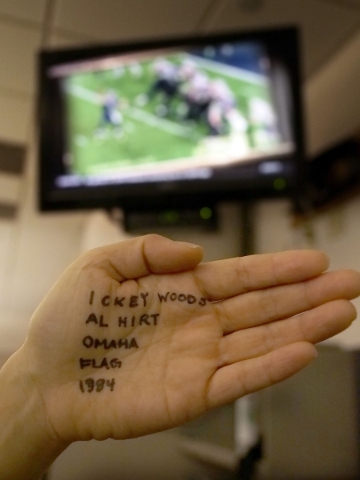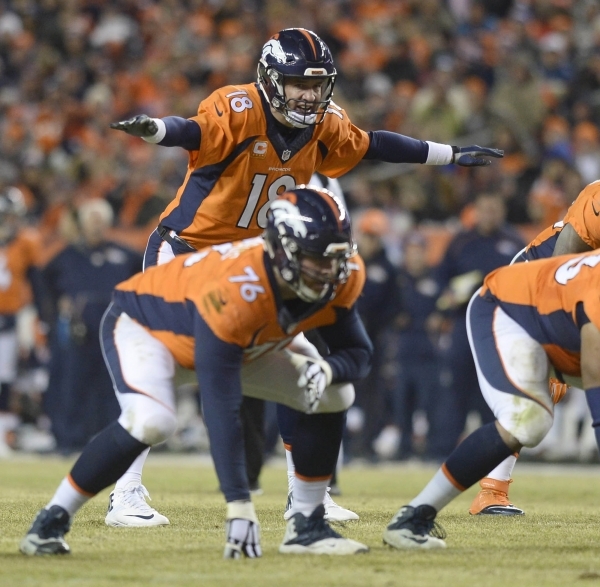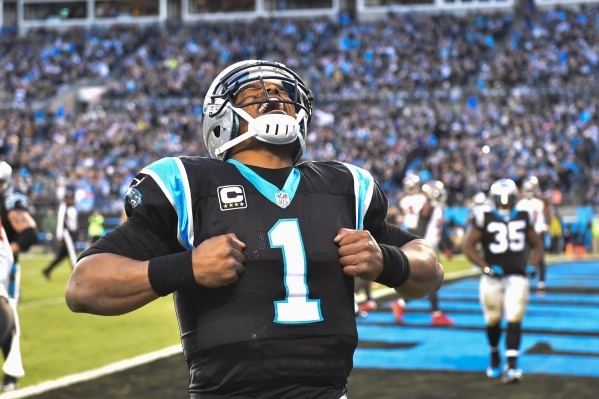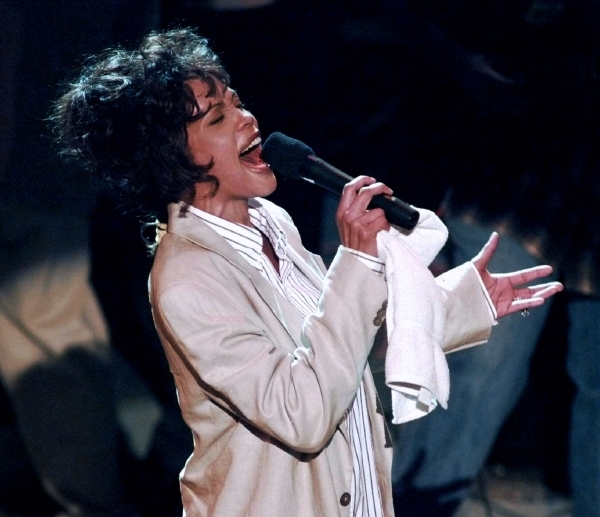How to bluff your way through a Super Bowl party
When the Carolina Panthers meet the Denver Broncos in Super Bowl 50 — which is scheduled to kick off at about 3:30 p.m. Sunday in Santa Clara, Calif. — millions of football fans around the world will be watching.
And so will millions of other people who couldn't possibly care less.
That's because the National Football League's annual championship game is more than a mere sporting event. Thanks to the NFL's tenacity in marketing its big game — a tenacity that makes Sherman's March to the Sea look like a Sunday morning nature walk — the Super Bowl has become America's premier midwinter celebration/party excuse.
As a result, millions of Americans who know nothing about the Super Bowl will attend Super Bowl parties anyway. But there's no reason for the football-averse to feel intimidated, because impressing fellow Super Bowl party guests with your knowledge of football and the big game requires nothing more difficult than slipping snippets of intelligent-sounding dialogue into the conversation at the proper times throughout the game.
Here, we offer a few suggestions about what to do and say in specific Super Bowl party situations. And remember: The secret to selling a good bluff is confidence, so lean in, hold your ground and have fun.
Situation: The first time somebody utters the words "Super Bowl."
What to do: Respond mockingly, but with the faintest hint of feigned alarm in your voice, "Don't say 'Super Bowl!' It's 'The Big Game!' "
What it means: The NFL is notoriously possessive of its trademarks and guards the use of the phrase "Super Bowl" like a helicopter mama lion sending her cubs to college. And, like any multibazillion-dollar company with money and lawyers to spare, the NFL has, in the past, been pretty ruthless about going after anybody who misuses its trademarks or uses them without permission.
That's why you'll see so many sports bars, casinos and commercial enterprises advertise their Super Bowl parties not as "Super Bowl" parties but as "Big Game" or "Championship Game" parties. By correcting your fellow partygoer's casual use of "Super Bowl," you're making a jokey insider allusion about the possible consequences of crossing the NFL over The Game That Must Not Be Named.
Situation: Right after the singing of the national anthem.
What to do: Sigh and say wistfully, "Nobody touches Whitney."
What it means: The late Whitney Houston sang what many football fans — and many music fans — consider the best performance of "The Star-Spangled Banner" ever.
It took place at Super Bowl XXV in Tampa, Fla., on Jan. 27, 1991. About a week-and-a-half earlier, the United States and its allies had embarked upon Operation Desert Storm. Set against the backdrop of the Persian Gulf War, fans encountered heightened stadium security that presaged life after 9/11 and pregame ceremonies punctuated by a sense of patriotism.
Houston, wearing a red, white and blue track suit, took the microphone and let loose with a rendition of our national anthem that was straightforward, plaintive, proud and inspiring all at the same time.
A few weeks later, a recording of Houston's anthem became a best-seller. Just more than a decade later, after the Sept. 11, 2001 attacks, a rerelease of Houston's anthem again became a best-seller among shaken Americans.
Situation: Anytime after the first few plays are run.
What to do: Say, sagely, "You know, defense wins Super Bowls."
What it means: Not much, frankly. Sure, keeping the other team from scoring will go a long way toward ensuring a win, and that's why a common school of thought holds that teams with strong defenses have a better chance of winning a Super Bowl.
Problem is, teams also have to score points to win a game, so having a strong offense is pretty important to winning Super Bowls, too. Besides, most fans — and, certainly, casual fans — find low-scoring Super Bowls boring (although that's probably a discussion for another time).
People who actually understand math and who have examined the defense-wins assertion have found it to be weak at best. Still, slipping this snippet of conventional wisdom into conversation during the game will mark you as a true football geek.
And if anybody wants to argue the point? Just smile condescendingly and walk away to get a drink, secure in the knowledge that, without such facile assertions, sports talk radio would cease to exist.
Situation: When you're selecting something from the snack table or buffet.
What to do: As another partygoer watches (otherwise this just looks dumb), start to reach for something, then suddenly stop, say "Omaha!" and immediately take something else.
What it means: Granted, this one is more about performance art, but it's cool because it's so subtle.
You see, Broncos quarterback Peyton Manning is famous for altering at the line of scrimmage the play that was called in the huddle. So, right before the center snaps the ball to him, Manning will shout and gesticulate like a charades player who's drawn a really complicated book title and then, at some point after all of this shouting and gesticulating and play-changing, will shout "Omaha!"
That means ... well, it's never been explained completely, but it seems to be a signal to his teammates that the play finally is going to be run.
So what you're doing here is mimicking Manning by planning to pick one item off of the food table and then shouting "Omaha!" to change your original plan and pick something else.
Like we say, subtle. But if anyone does get the joke, trust us, it'll be hilarious.
Bonus: Whenever it looks like either Manning or Panthers quarterback Cam Newton is, in fact, changing a play at the line of scrimmage, casually tell fellow partygoers that he's "audibilizing." Changing a play at the line of scrimmage used to be referred to as "calling an audible," but that perfectly serviceable phrase, somehow and beyond all that is linguistically good and holy, has been twisted into a verb that has absolutely no right to exist.
Situation: One of the guys on your team tries to catch the ball but is prevented from doing so by a guy from the other team sticking his hand or arm into your guy's face, and the referees seem to be OK with it.
What to do: Say, in an exasperated tone of voice, "Hey, where's the flag?"
What it means: You're expressing your desire that the referees penalize the other team's guy for pass interference, which would mean that the defender (the other guy) went beyond what he's allowed to do to prevent the receiver (your guy) from catching the ball.
So what constitutes pass interference? Who knows?
Seriously. At least a dozen times during a typical game, players, coaches and fans will argue about a pass interference call that was made or should have been made or shouldn't have been made, and that means you can pretty much utter this anytime you see your guy in the middle of a contested pass without fear of anybody else conclusively proving you wrong.
Situation: The "Super Bowl 50" logo appears on the TV screen.
What to do: Shake your head, chuckle and say, "How are kids ever going to learn Roman numerals?"
What it means: If the NFL were a person, it'd be that annoying party guest (like that guy over there!) who thinks just a bit too highly of himself. So, for most of the Super Bowl's existence, the NFL has been denoting each year's game with snobbish, better-than-you Roman numerals (which, by the way, is interesting, considering how reluctant we Americans are to embrace the metric system, although, again, that's probably a discussion for another time).
But not this year. This year's logo marking the 50th-anniversary Super Bowl uses the digits "5" and "0" rather than the Roman numeral for 50.
Which is "L." And, really, how dumb would "Super Bowl L" look on a T-shirt? People would just think it's the T-shirt's size.
The NFL says the single-year switch away from Roman numerals was made for aesthetic and marketing reasons, but you're remarking on the bizarreness of not seeing Roman numerals associated with a Super Bowl and, in a mock-horrified tone, how terrible it is that American schoolkids might, as a result, never know that "L" is the Roman numeral for "50."
Because kids need to know Roman numerals for ... well, something, right?
Situation: Fellow partygoers express their love of one of those high-priced, made-for-the-Super-Bowl TV ads.
What to do: Wait for everyone's comments to subside and say, "It's good, but it's no '1984.' "
What it means: Here, you're referencing the most famous Super Bowl ad ever, Apple Computer's "1984" ad, which aired during the 1984 Super Bowl and has been consensus pick for best Super Bowl ad ever since.
The ad opens on a bunch of workers walking lockstep in a gray industrial world who gather to watch an address from a despotic leader on a giant video screen. Suddenly, a lithe blonde in a red and white track outfit runs into the assembly hall and flings a hammer into the video screen, smashing it to pieces and freeing the workers from their Orwellian enslavement.
Then wording on the screen is read aloud: "On January 24th, Apple Computer will introduce Macintosh. And you'll see why 1984 won't be like '1984.' "
The ad is memorable for lots of reasons, including its unsubtle swipe at then-computer giant IBM, its direction by Ridley Scott ("Alien," "Blade Runner," "Gladiator," "The Martian") and the fact that it heralded the beginning of the home computer revolution.
But, mostly, it's memorable because it's the ad that helped to create the very phenomenon of the "Super Bowl ad."
Situation: After the halftime show with Coldplay and Beyonce.
What to do: Say, with a tinge of sincere sadness, "Rest in peace, Al Hirt."
What it means: For a decade or two, before Super Bowl halftime shows became Who-ed, Chili Peppered, Springsteened, Stoned, Jacksoned and Madonna-ed to death, they were lower-key events, kicked up a meager notch or two from the shows you'd see at any other sporting event.
That's why the very first Super Bowl halftime show — at what then was called the more modest AFL-NFL World Championship Game — featured a solid but hardly groundbreaking lineup that included a University of Arizona band and trumpeter and bandleader Al Hirt, who's most remembered by baby boomers for performing the theme song for "The Green Hornet" television series.
Super Bowl halftime shows remained pretty much the same over the next few decades, featuring lots of college bands, B-level performers and tributes to various things. Now, Super Bowl halftime shows are events unto themselves, boasting A-list performers and their own sponsors, and a Super bowl halftime show can end up being the most talked-about event of the entire game (Hello, wardrobe malfunction ... ).
So, offer up a posthumous salute to Al Hirt and impress fellow partygoers that your Super Bowl halftime show knowledge extends beyond last year, when Whoever-It-Was performed.
Situation: A player performs an end zone dance after scoring a touchdown.
What to do: Say, "Nobody's got moves like Ickey."
What it means: You're paying tribute to the "Ickey Shuffle," the touchdown dance made famous by Elbert "Ickey" Woods, who played running back for the Cincinnati Bengals from 1988 to 1991 (and who played in Super Bowl XXIII, in which the Bengals lost to the San Francisco 49ers 20-16).
Calling Woods' touchdown celebration a dance is stretching the definition of the word. It's more a succession of steps and hops, and ends with the spiking of the football. But America loved it, and Woods even reprised his Shuffle in a Geico commercial.
Today, the tradition of the end zone dance has been dampened a bit by rules against excessive on-field celebration. But refs seem OK with it as long as it's not too blatant, and Panthers quarterback Cam Newton even showed off some end zone moves this past season.
By the way, mentioning Woods will score you hometown points with partygoers: Woods played college ball at the University of Nevada, Las Vegas, where he set several records and has been inducted into the school's athletic hall of fame.
— Read more from John Przybys at reviewjournal.com. Contact him at jprzybys@reviewjournal.com and follow @JJPrzybys on Twitter.




















